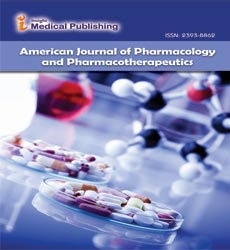ISSN : 2393-8862
American Journal of Pharmacology and Pharmacotherapeutics
Hepatotoxicity Associated with Carvedilol
Abeer Alharbi*
Cardiology Clinical Pharmacist, Security Forces Hospital, Riyadh, Saudi Arabia
Abstract
Objective: The serum transaminases document is severe elevated in a patient who was receiving Carvedilol.
Case Summary: A 65-year-old Saudi man admitted to hospital with acute heart failure (EF 15%), acute liver failure and acute kidney injury. He was admitted to CCU and started treatment. Within one week the kidney and the liver function improved. After that the doctor changed Bisoprolol to Carvedilol for one day only, the laboratory tests showed elevated serum transaminases. So, discontinued Carvedilol immediately and restart bisoprolol the liver function returned to the normal within four weeks.
Conclusion: Carvedilol may cause liver enzymes elevated in liver impairment patient. This reaction resolves if the patient is switched to another beta- blocker. Carvedilol is contraindication in sever hepatic impairment.
Keywords
Carvedilol, Hepatotoxicity, Transaminases.
Introduction
Heart failure is a complex syndrome that can result from the heart muscle is unable to pump enough blood through to meet the body's needs for blood and oxygen. That will lead to shortness of breath, fatigue and weakness, swelling (edema) in legs, ankles and feet, rapid or irregular heartbeat, reduced ability to exercise.
It is affects around 26 million people worldwide. There are more than 6 million people in the USA. Heart failure is the main cause of hospitalization for patients over the age of 65 years [1-3].
Treatment
a. Diuretics are to reduce symptom (edema). No benefit on mortality.
b. Angiotensin-converting enzyme inhibitors (ACEIs) is neurohormonal blocked, vasodilatation, mortality benefit.
c. Angiotensin receptor blockers (ARBs) is neurohormonal blocked, vasodilatation, mortality benefit.
d. Beta-adrenergic blockers are neurohormonal blocked, mortality benefit.
e. Aldosterone antagonists, benefits in NYHA class III and IV heart failure, mortality benefit.
f. Hydralazine and nitrates reduces afterload and preload. Alternative in patients who cannot tolerate an ACEI/ARB or as an add-on therapy to ACEI/ARB and beta-blockers in African Americans patients.
g. Digoxin improves heart failure symptoms, and decreased rate of heart failure hospitalizations.
β-blockers
β-blockers indicated to improve signs and symptoms, exercise tolerance, and hemodynamics and reduce mortality in patients with heart failure [3].
Carvedilol
Carvedilol was approved by the Food and Drug Administration in 1997 for the treatment of heart failure [4]. Carvedilol is a nonselective β-blocker without intrinsic sympathomimetic activity. It has antagonist activity against alpha1, beta1 and beta2 receptors.
Long-term treatment with carvedilol will reduces morbidity and mortality and enhances survival [5,6].
Case Summary
A 65 years old Saudi man was admitted to hospital with Acute Heart Failure (EF 15%), Acute Liver failure (ALT 1544 U/L, AST 1253 U/L, Bilirubin T 100 umol/l, Gamma GT 999 U/L), Acute Kidney Injury (Cr 140 umol/l) (herbal causes).
He was admitted to CCU and start Aspirin 81 mg, Bisoprolol 1.25 mg, Furosemide 40 mg IV bid, Lisinopril 2.5 mg, Digoxin 125 mcg, Spironolactone 12.5 mg.
After one week the kidney function returned to normal and the liver function improved within three weeks. Then the doctor change Bisoprolol to Carvedilol 3.125 mg bid for one day only after that the serum transaminases elevated. So, discontinued carvedilol immediately and restart bisoprolol the liver function returned to normal within four weeks [7-9].
Discussion
The hepatotoxicity adverse effect resolves if the patient is switched from carvedilol to another beta blocker. The liver function test abnormalities return to normal if discontinuation of carvedilol.
Conclusion
Carvedilol may cause liver enzymes elevated in liver impairment patient. This reaction resolves if the patient is switched to another beta- blocker. Carvedilol is contraindication in sever hepatic impairment.
Declarations
Availability of data
Data is available in the records of the hospital.
Ethics approval and consent to participate
Not applicable.
Consent for publication
Written informed consent was obtained from the patient for publication of this case report.
Competing interests
The authors declare that they have no competing interests.
References
- Yancy C.W., Jessup M., Bozkurt B., et al. 2017 ACC/AHA/HFSA focused update of the 2013 ACCF/AHA guideline for the management of heart failure. A report of the American College of Cardiology/American Heart Association Task Force on Clinical Practice Guidelines and the Heart Failure Society of America.
- European Society of Cardiology (ESC). The task force for the diagnosis and treatment of acute and chronic heart failure of the European Society of Cardiology (ESC). 2016.
- Krum H., Sackner-Bernstein J.D., Goldsmith R.L., et al. Double-blind, placebo-controlled study of the long-term efficacy of carvedilol in patients with severe chronic heart failure. Circulation 1995; 92: 1501-1506.
- Fisher M.L., Balke C.W., Freudenberger R., Therapeutic options in advanced heart failure. Hosp Pract 1997; 32: 97-106.
- Metra M., Nardi M., Giubbini R., et al. Effects of short and long-term carvedilol administration on rest and exercise hemodynamic variables, exercise capacity and clinical conditions in patients with idiopathic dilated cardiomyopathy. J Am Coll Cardiol 1994; 24: 1678-1687.
- ACPJ. Randomized, placebo-controlled trial of carvedilol in patients with congestive heart failure due to ischaemic heart disease. Australia/New Zealand heart failure research collaborative group. Lancet 1997; 349: 375-380.
- Hagmeyer K.O., Stein J., Hepatotoxicity associated with Carvedilol. Ann Pharmacother. 2001; 35: 1364-1366.
- GSK., Package Insert©. Glaxo Smith Kline 2008.
- Packer M., Bristow M.R., Cohn J.N., et al. The effect of carvedilol on morbidity and mortality in patients with chronic heart failure. N Engl J Med 1996; 334: 1349-1355.
Open Access Journals
- Aquaculture & Veterinary Science
- Chemistry & Chemical Sciences
- Clinical Sciences
- Engineering
- General Science
- Genetics & Molecular Biology
- Health Care & Nursing
- Immunology & Microbiology
- Materials Science
- Mathematics & Physics
- Medical Sciences
- Neurology & Psychiatry
- Oncology & Cancer Science
- Pharmaceutical Sciences
